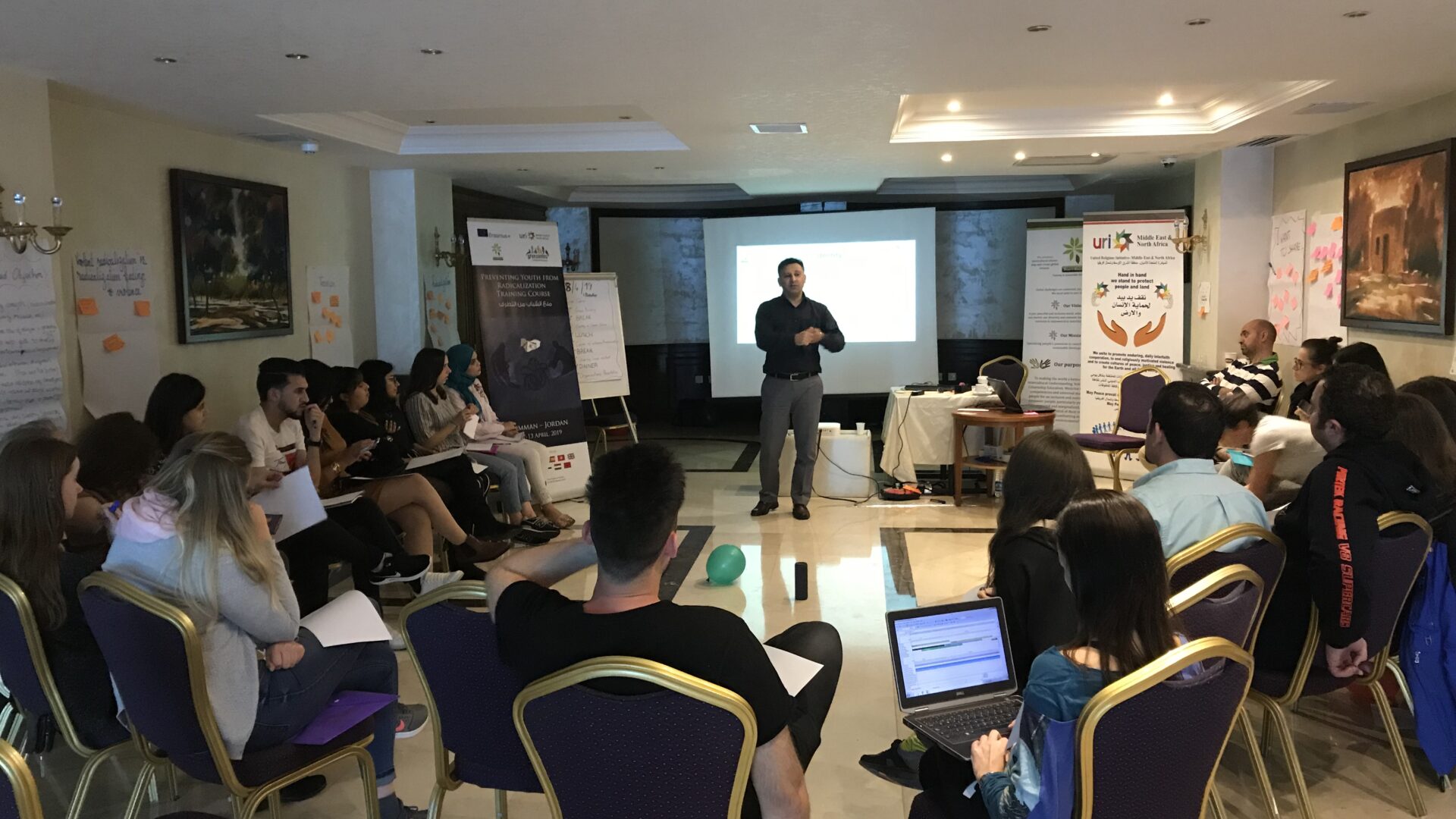Preventing Youth from Radicalization
Training Course, 7th -13th April 2019, Sadeen Hotel, Amman – Jordan
Desert Bloom hosted a five-day intensive training course on Preventing Youth from Radicalization co-organized by URI MENA and Grenzenlos – Interkultureller Austausch (ICYE Austria). The project was greatly funded by European Union under Erasmus Plus program. The training was attended by 25 youth workers/organizations’ leaders from Europe (Austria, Finland, Portugal, Spain and UK) and MENA regions (Algeria, Jordan, Morocco, Palestine and Tunisia).
The training fulfilled its aims and objectives:
- Enhanced participants’ knowledge about different religions and cultures.
- Promoted interfaith and intercultural understanding and cooperation.
- Empowered participants with the competencies needed to prevent youth from radicalization through media literacy, combating hate speech, intercultural sensitivity, interfaith dialogue, critical thinking, nonviolent communication and youth economic inclusion.
- Raising awareness about groups that are more vulnerable to radicalization within our societies and allowing participants to discover the different situations of other participating countries.
- Promoting tolerance and diversity towards other religions within local and international voluntary and youth projects.
- Produced a framework that provides youth workers with guidance to prevent youth from radicalization.
- Sharing good practices from Arab countries and Europe.
- The program was designed to equip the participants with the necessary competencies to prevent youth from radicalization in their communities. It covered the following topics/ activities:
– Understanding main concepts and terminologies related to violent radicalization. Several misconceptions and stereotypes were highlighted.
– The process of violent radicalization (5 steps to violent radicalization, Moghaddam’s Staircase Model to Terrorism).
– Causes of extremism and radicalization leading to violence (pull & push factors).
– Causes of youth radicalization – sharing local contexts.
– Interactive lecture on “The role of Christian tradition in preventing violent extremism (PVE)”, led by Rev. Samer Azar (the Pastor of the Evangelical Lutheran Church in Jordan and the Holy Land, and the Representative of the Evangelical Lutheran Church in Jordan).
– Interactive lecture on “The role of Islamic tradition in preventing violent extremism (PVE)”, led by Imam Dr. Mohammed Rawashdeh, Khalda Musque.
– Role of education in PVE – Intercultural citizenship education
– Building plural, diverse, and multicultural collective identities.
– Trip to Madaba. The group visited:* Mount Nebo is an elevated ridge in Jordan, approximately 710 meters above sea level. According to the Hebrew Bible, is the site where Prophet Moses (peace be upon him) viewed the Promised Land. The view from the summit provides a panorama of the Holy Land. Mount Nebo, just west of Madaba city, formed part of the Madaba Diocese during Byzantine times.
* Church of the Beheading of John the Baptist, a historic Catholic Church in Madaba, belonging to the Patriarchate of Jerusalem, as a Shrine of the Beheading of Saint John the Baptist.
* The Mosque of Jesus Christ, founded in 2008 to send out a message of togetherness and tolerance. The Mosque’s name shows how Muslims respect and venerate Jesus Christ as one of God’s greatest messengers to humankind. -
Competency-building sessions included:
* PVE – Media Literacy- Media & Trauma, by Ahmad Abojaradeh, Executive Director, Life in My Days
* PVE – Critical Thinking
* PVE- Emotional Intelligence
* PVE- Youth Economic Empowerment - Developing a framework to prevent violent extremism
- Introduction of Erasmus + and Projects Development
At the end of the training, the participants came up with the following recommendations to decision makers:
– Creating a Youth Passport: a passport for youth (for a specific age limit), to facilitate youth mobility (visas), discounts for logistics, access to different youth events.
– More meetings and conventions between South-North, either bilateral for example between Finland – Algeria, Tunisia – Austria, Jordan- Spain…etc, or multilateral; several countries together.
– More dialogue between different religions, for example arranging events with representatives from different religious groups to promote mutual understanding.
– Empowering women’s participation in leading religious groups.
– Including intercultural citizenship in official education curriculum.
For more photos, visit the below link:
https://drive.google.com/drive/folders/11MHu2IlQbnYOHJ2VPaaExsdaHtfEtziT…
